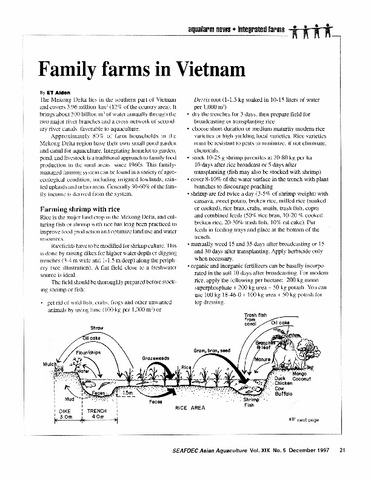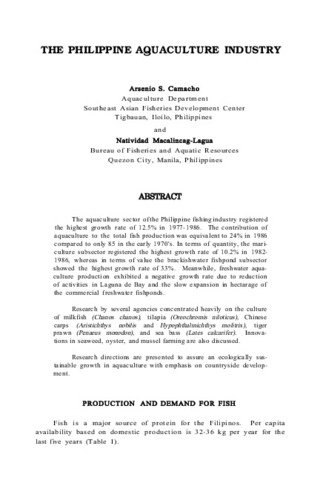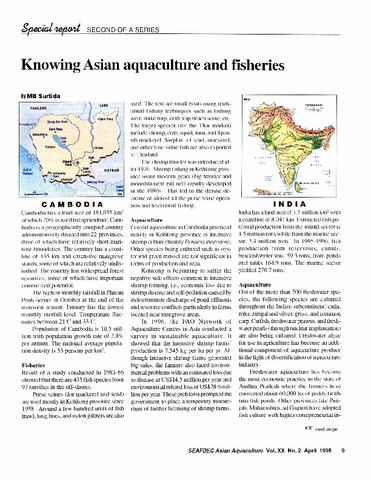| dc.contributor.author | Luu, Le Thanh | |
| dc.contributor.editor | Acosta, Belen O. | |
| dc.contributor.editor | Coloso, Relicardo M. | |
| dc.contributor.editor | de Jesus-Ayson, Evelyn Grace T. | |
| dc.contributor.editor | Toledo, Joebert D. | |
| dc.date.accessioned | 2013-12-06T02:24:36Z | |
| dc.date.available | 2013-12-06T02:24:36Z | |
| dc.date.issued | 2011 | |
| dc.identifier.citation | Luu, L. T. (2011). Vietnam: status of implementation of the resolution and plan of action on aquaculture. In B. O. Acosta, R. M. Coloso, E. G. T. de Jesus-Ayson, & J. D. Toledo (Eds.), Sustainable aquaculture development for food security in Southeast Asia towards 2020. Proceedings of the Regional Technical Consultation on Sustainable Aquaculture Development in Southeast Asia Towards 2020 (pp. 129-133). Tigbauan, Iloilo, Philippines: SEAFDEC Aquaculture Department. | en |
| dc.identifier.isbn | 9789718511992 | |
| dc.identifier.uri | http://hdl.handle.net/10862/1830 | |
| dc.description.abstract | Aquaculture in Vietnam achieved significant increase in production from 425,000 mt in 1998 to 2,465,600 mt in 2008 and this has contributed to addressing the country s food security agenda. This achievement has indicated success of a number of factors including implementation of appropriate policies, technological improvements in aquaculture, efficiency of extension work, and capacity of market expansion. Improvement of seed production and supply through strengthening the infrastructure of hatchery system throughout the country and diversification of culture species have contributed to achieving the goal of aquaculture development programs for the period 1999-2010. The challenge on the use of fish meal is being addressed by using the omnivorous fish species such as the carps, tilapias, pangasius and mollusks for large-volume production. Environment-friendly technologies are developed and applied in aquaculture practices. Good aquaculture practices and Best management practices have encouraged the different stakeholders (seed producers, growers, feed suppliers) to apply these practices in their business. Aquaculture is seen as an important sector for rural development because this contributes significantly to income and employment for rural population, on one hand, and better use of land (where agriculture operation is not economically feasible) and water resources, on the other hand. Nevertheless, aquaculture in Vietnam is still faced with a number of issues which need to be addressed and these are as follows: (a) capacity to guide sustainable aquaculture; (b) appropriate policies to fit into new development trends; (c) quality of economically important species; and (d) traceability, certification and linkage to market chain of small scale producers. Some important points of aquaculture development plan in Vietnam during the period 2011-2020 are also introduced in this paper. | en |
| dc.language.iso | en | en |
| dc.publisher | Aquaculture Department, Southeast Asian Fisheries Development Center | en |
| dc.subject | Viet Nam | en |
| dc.title | Vietnam: status of implementation of the resolution and plan of action on aquaculture. | en |
| dc.type | Conference paper | en |
| dc.citation.spage | 129 | |
| dc.citation.epage | 133 | |
| dc.subject.asfa | aquaculture | en |
| dc.subject.asfa | aquaculture development | en |
| dc.subject.asfa | aquaculture economics | en |
| dc.subject.asfa | breeding | en |
| dc.subject.asfa | culture effects | en |
| dc.subject.asfa | feeds | en |
| dc.subject.asfa | fish culture | en |
| dc.subject.asfa | fish diseases | en |
| dc.subject.asfa | fishmeal | en |
| dc.subject.asfa | food security | en |
| dc.subject.asfa | national planning | en |
| dc.subject.asfa | seed (aquaculture) | en |
| dc.subject.asfa | sustainability | en |
| dc.subject.asfa | aquaculture regulations | en |
| dc.subject.asfa | certification | en |
| dc.subject.asfa | environmental impact | en |
| dc.subject.asfa | socioeconomic aspects | en |
| dc.citation.conferenceTitle | Sustainable aquaculture development for food security in Southeast Asia towards 2020. Proceedings of the Regional Technical Consultation on Sustainable Aquaculture Development in Southeast Asia Towards 2020 | en |



